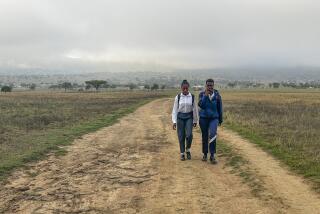Black Students’ Strike Grows in S. Africa
- Share via
JOHANNESBURG, South Africa — The Soweto-inspired student boycott of black schools spread to other townships Thursday, accompanied by sporadic student violence that was the most widespread of the two-month-old state of emergency.
Secondary schools in several black townships were deserted except for teachers and security forces.
Thursday’s violence was less sustained and intense than on Wednesday, when students roamed the black township of Soweto, stoning and setting fire to vehicles. But the class boycott spread to Alexandria township north of Johannesburg and to other black townships. Many primary students joined the boycott, which largely affected secondary schools.
The boycott is to protest soldiers on campus, detention of students under the state of emergency and the mandatory use of identity cards on school grounds. The government said the rules were imposed to keep out troublemakers and end two years of student turmoil.
In other developments, an elderly black woman was burned to death; a provincial Supreme Court, contradicting a previous ruling, upheld the indefinite imprisonment of dissidents without charge, and the African National Congress rejected a government offer for blacks to elect delegations to a national advisory council.
The government’s Bureau for Information said Thursday that nine blacks burned to death a 65-year-old woman Wednesday outside her house in Kwaggafontein, in the Kwandebele homeland. More than 100 people have been killed in Kwandebele in the last seven months, and bitterness over a plan for homeland independence--a proposal rejected Tuesday by the legislative assembly--has been blamed for most of the slayings.
Attacker Slain
The bureau said security forces arrived at the house of Selina Thabete and fired three shots at her attackers, killing one and arresting the other eight.
The two deaths brought to at least 229 the number of people killed in unrest violence since President Pieter W. Botha declared a state of emergency June 12.
A three-judge panel in Natal provincial Supreme Court on Thursday turned down an application for the release of Peter Kerchoff, of the Assn. for Christian Social Awareness, who has been held without charge since June 12.
Justice J.J. Kriek, in a 50-page explanation of the ruling, said President Botha “has already decided that the arrest and detention of all people who are a threat to the public peace will hasten the end of the state of emergency.”
The decision in Pietermaritzburg directly contradicted a ruling Monday by another panel of the same court striking down key sections of the detention regulations.
Monday’s ruling, widely viewed as a major challenge to the emergency, said Botha exceeded his authority in empowering any security force member to detain without charge anyone deemed a possible threat to public order, and in allowing such detainees to be held indefinitely.
The discrepancy between the decisions is expected to be resolved by an appellate court.
In Lusaka, Zambia, the African National Congress turned down Wednesday’s offer by the South African government to organize elections among the black majority for black delegates to a proposed national council that might draft a new power-sharing constitution.
The congress, the main guerrilla group fighting to topple the white-dominated Pretoria government, has dismissed these reforms as irrelevant, saying the government remains as opposed as ever to the principle of black majority rule.
ANC spokesman Tom Sebina said the offer contained nothing new. “They are just playing around with concepts, saying in different forms the same things they have been saying since they started with the reforms.”
More to Read
Sign up for Essential California
The most important California stories and recommendations in your inbox every morning.
You may occasionally receive promotional content from the Los Angeles Times.










